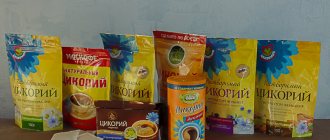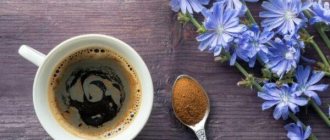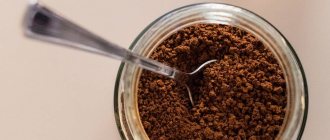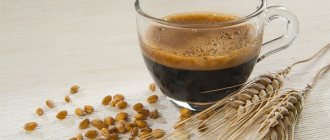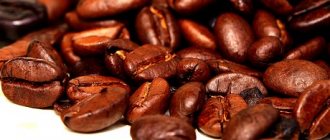It is familiar to us as an invigorating drink that can replace traditional coffee, but the history of chicory is much richer and more interesting. It is used as a medicine and a food additive, but the plant itself is still considered a common wild weed that can be found in any meadow.
Why is it worth trying chicory, even if you are not going to give up coffee? Let's tell you in order.
What is chicory coffee substitute?
Chicory powder is a coffee drink similar to instant espresso. It is added to chocolate and other confectionery products, and also brewed with boiling water and drunk as an analogue of grain tonic.
A reddish-brown powder is obtained from the dried and baked root of a perennial plant of the Asteraceae family, familiar to everyone, since chicory grows everywhere in fields, courtyards and forests on any, even sandy, soils. There are different types of plants - wild and cultivated for industrial purposes. Edible chicory is grown on a large scale to make a medicinal drink that is quite tasty.
For many hundreds of years, chicory has been known in folk medicine as a remedy that stimulates the liver and digestive system. Research on the drink, comparing its properties and benefits with natural coffee, is still being carried out to this day. Today, the root is considered harmless, and its main advantage is the absence of caffeine in the composition. Chicory-based drinks are included in the diet of people suffering from hypertension, acidity imbalance, as well as vegetarians.
Excursion into history
According to legend, coffee beans were stored in the royal storerooms of Suleiman the Magnificent.
The invigorating elixir was the privilege of crowned heads, but one day the Sultan noticed that his guards were drinking coffee. He initially accused them of theft, but an investigation revealed a different composition of the broth. The guards were preparing an infusion of chicory, which Suleiman liked. There is also an unconfirmed version that the idea of brewing a coffee drink belongs to the Dutch. Historians have revealed another interesting fact regarding the blockade of Britain by Napoleon in the early 19th century. Due to the ban on the import of goods, the French were deprived of their favorite products, including coffee, the cost of which increased several times. Buyers preferred only natural grains, not wanting to spend money on ground surrogate.
Traders found a way out using a paste from the rhizome of the plant and special molds in which it hardened. After drying, the workpieces could not be distinguished from coffee beans in appearance. The mixture was marketed for a long time as a natural product because no one could tell the difference.
The healing properties of the root were described in the works of Dioscorides and Theophrastus; Avicenna used the plant to treat joints and improve digestion. The first mention of chicory infusion in Rus' dates back to 1800, and a plant for the production of soluble raw materials on a natural basis was opened in the second half of the 19th century by an enterprising Frenchman.
The idea belonged to Alphonse Peru, who decided to simplify the process of preparing the aromatic drink. There was no longer any need to grind and brew grains - just add the thick paste to a cup and add hot water. However, the appearance of the concentrate was so unsightly that the French preferred to spend a little more time getting their usual coffee. Over time, the formula of the composition and the processing of raw materials changed, thanks to which the product gained popularity.
What does instant chicory taste like?
The taste of a solution of chicory root, used instead of coffee, is similar to something between herbal tea and golden-brown baked goods with a crust; it has a roasted smell with notes of bitterness and sweetness, without acid. It only vaguely resembles coffee aroma, but can replace a harmful tonic in the diet.
Chicory is drunk instead of coffee with various additives to improve taste:
- with honey and sugar;
- spices - cinnamon, nutmeg, cardamom, star anise;
- carob, cocoa or coffee;
- slices of lemon or orange;
- caramel, chocolate and nut syrup.
It is recommended to avoid combination with natural milk and give preference to plant-based options - almond, soy. You can add butter or coconut oil to your drink to enrich and enhance its medicinal properties.
Why chicory is valuable: the benefits and harms of the product
They started using chicory instead of coffee for a reason. If grain extract is prohibited for medical reasons, the beneficial properties of the field plant will help replace it and even alleviate the illness. An infusion of flowers and roots is drunk for digestive problems, to fight parasites, for anemia, and also to strengthen the immune system and nervous system. The healing effect of the root extends to many systems in the body:
- Chicory does not contain caffeine, so it does not lead to painful arousal, pressure surges and arrhythmia. It is used for hypertension, heart disease, during stress and overwork.
- Important B vitamins and microelements increase defenses and normalize metabolism, promoting the breakdown of adipose tissue.
- The composition contains inulin, a polysaccharide that regulates glucose concentration, helps control hunger, and reduce blood sugar levels. It is useful for diabetes and for weight loss.
- Chicory also stimulates liver function, bile flow, and promotes the elimination of toxins due to its bitterness.
- It has antibacterial and anti-inflammatory effects and supports the fight against parasites.
- Thanks to the iron, calcium and manganese that the plant contains, it is involved in hematopoiesis, increases hemoglobin levels, and accelerates healing processes.
- The potassium content improves kidney function and promotes the elimination of excess fluid.
- Vitamins A and C help maintain healthy blood vessels and heart.
Chicory is prepared instead of coffee or as an original infusion to normalize sleep, during a stressful period, when you need to reduce the load on the heart and nerves, during pregnancy and lactation. It is recommended for diabetes, atherosclerosis, and on diets for weight loss and cleansing the body. It has a positive effect on the health of skin and hair, maintains normal acid-base balance in the mouth, and does not destroy tooth enamel.
There is practically no harm from the root. Contraindications include:
- individual intolerance and allergy to asteraceae;
- acute diseases of the stomach and intestines;
- hypotension, varicose veins and other cardiovascular diseases associated with low blood pressure;
- renal failure.
In such cases, you should drink the drink in moderation, strictly monitoring your health.
Chicory is introduced instead of coffee into the diet of children, old people, pregnant women, during fasting, and on diets. It can also be included in sports nutrition and during an active lifestyle - it does not disrupt electrolyte metabolism, does not retain moisture in the body and does not overload the heart and muscles.
Mate tea
Yerba mate is a herbal tea that contains caffeine. Mate is great for increasing mental focus and energy levels.
The drink has many fans in Asia and South America. As real fans of mate report, it, unlike coffee, does not cause nervousness.
Group of Companies "Matsesta Tea" /
This tea also contains nutrients that fight inflammation and stimulate various processes in the body.
However, consuming mate can be hazardous to health. According to registered dietitian Katherine Zeratsky of the Mayo Clinic, yerba mate may increase your risk of certain types of cancer. Among them are oncology of the mouth, throat and lungs. It is better to drink cooled tea, because its hot temperature is associated with the above risks.
Which is healthier: real coffee or chicory?
Many people wonder whether root extract can replace coffee in terms of health benefits and how they differ from chicory. The main difference is the presence of caffeine and theobromine in sweet beans, while they are not present in the field plant. Otherwise, the composition does not make much difference: chicory contains sodium, potassium, magnesium, iron, phosphorus, manganese, vitamins B, A, C and PP, as well as bitter and tannin compounds.
Coffee is distinguished by a soft, non-herbaceous bitterness, noble shades of chocolate, nuts and fruits in the flavor and aromatic bouquet, pronounced sourness and thickness. Chicory does not have such an organoleptic palette - it is almost completely dissolved in water, does not leave sediment or a long aftertaste.
The main differences between the drinks are:
- coffee raises blood pressure and stimulates the heart, has an antioxidant effect, promotes concentration, improves body odor;
- chicory - relaxes and dilates blood vessels, fights parasites, stimulates the liver;
- both drinks support the excretory system, normalize acidity, and promote bodily cleansing.
It is impossible to say unequivocally which is better: coffee or a drink made from chicory; they are not equivalent in their properties and are noticeably different. Doctors advise alternating both drinks in your menu and taking into account individual indications. If, due to the condition of the patient’s liver or kidneys, a chicory drink is not suitable, they offer cereal options or carob.
Main differences between drinks
Only caffeine can wake up the body, increase concentration and increase performance, but after half an hour its effect decreases. Chicory does not invigorate you as sharply as coffee, but provides an even boost of energy for several hours.
Among other differences identified:
- Taste. Coffee is a symphony of aromas, a pleasant aftertaste and additional notes. The balance and richness of the drink is an undeniable advantage of Arabica and Robusta beans. The taste and smell of chicory is not for everyone, since it bears little resemblance to natural espresso.
- Benefit. Coffee irritates the gastric mucosa and is persistently addictive. Chicory contains inulin, which feeds bifidobacteria and lactobacilli, improving the microflora of the gastrointestinal tract.
- Calorie content. Coffee is better than chicory for weight loss, since its energy value is 2 kcal per cup. Although the root of the plant is considered a dietary product, a serving of the drink contains 23 kcal.
In terms of the presence of vitamins and microelements, chicory is healthier than coffee, but its specific taste does not allow it to be called a full-fledged espresso substitute.
Cautions
It is not advisable to make your own drink from crushed root, since some varieties may not be edible. It is better to buy a ready-made “coffee substitute” or grow cultivated types of grass on your site.
You should not abuse chicory instead of strong coffee. You can drink 4-6 cups per day, which is approximately equal to 2 servings of espresso. If the drink is drunk every day, then it is undesirable to exceed the dose of 3-4 servings. It is also important how much raw material is taken per cup - you should not exceed the limit of 1-2 teaspoons.
Excessive consumption can cause nausea, heartburn, low blood pressure, heart rhythm disturbances, diuretic effect, pain in the gall bladder, and general malaise.
To understand how many calories are in a drink, you need to:
- count the number of spoons of sugar - 20-25 kcal in one;
- add the calorie content of used milk - approximately 10 kcal in 20 ml of cow's milk;
- take into account other additives - syrups, oils.
Chicory itself contains only 11 kcal per 100 g of dry raw material, so you can ignore it when calculating - there will be no harm to your figure.
Contraindications for use
Like any medicinal plant, chicory has various contraindications:
- Peptic ulcer of the stomach, intestines;
- Phlebeurysm;
- Haemorrhoids;
- Various diseases of the body's vascular system;
- Chronic bronchitis, asthma.
- Chicory contains vitamin C, which is often a source of allergies.
It is recommended to use it with caution by women and children under 3 years of age.
If the dosage is exceeded, chicory can harm the body, especially for pregnant and lactating women. The daily dose of powder is 2-3 teaspoons.
Interesting recipes: how to brew chicory instead of coffee
If you can’t use coffee brew or don’t want to spend money, it is replaced with “golden root”. Here's how to make chicory coffee - basic recipe:
- take 1.5 tsp. dry raw materials per cup 200 ml;
- pour boiling water over it;
- Stir thoroughly and leave for 6-10 minutes.
After settling, the drink becomes better and tastier; there is no need to boil the mixture. When pouring warm and cool water, you need to infuse longer and stir the liquid. If you take chicory barley, you can increase the portion to 2 tablespoons, since the pure root is more bitter, and the cereal drink turns out softer and more aromatic - the difference is noticeable. Adding grains does not detract from the benefits of the infusion.
Additives to chicory prepared instead of coffee
Lovers of healthy drinking can add any additives to their portions:
- Diabetics and those on a weight loss diet are allowed to use honey - ½ or a whole spoon per cup.
- If regular sugar is not enough, the cane version will improve the flavor, and caramel topping or burnt sugar syrup will also work.
- You can diversify the aroma with cocoa powder, carob, chocolate syrup, nut liqueur, and vanilla extract.
- For special gourmets, there is an option with spices: cinnamon, nutmeg - on the tip of a spoon, lemon or orange zest (you can take 1-2 drops of essential oil), cardamom - 1 box or even half a cup.
- You can soften the texture and extinguish the bitterness with creamy ingredients. Experts recommend plant-based milk - made from almonds, soy, and wheat.
The proportions - how much of what to take - are chosen according to taste. If you focus on coffee, instead of which chicory is chosen, all doses should be slightly smaller, since the “golden root” is not so thick and intense in strength.
Root coffee with burnt sugar (caramelized syrup) is considered the most beneficial combination among other warm cocktails.
How to make an invigorating shot
Many people have heard that chicory is used instead of coffee, but not everyone knows that both components can be combined. For better aroma, you can sprinkle the portion with a pinch of ground coffee or make a mix of instant ingredients. This will reduce the strength and prevent the drink from increasing blood pressure too much, but will give it an invigorating effect. You can drink this infusion 2-4 times a day, depending on your health condition.
Chicory goes well with baked goods and fruit desserts, it can be drunk at any time of the day - for breakfast or an afternoon snack it will help tone the body, at lunch and dinner it will support digestion and will not interfere with sleep.
Try something new - the difference in taste may turn out to be insignificant, and the improvement in well-being will be a pleasant incentive to add chicory to your menu.
